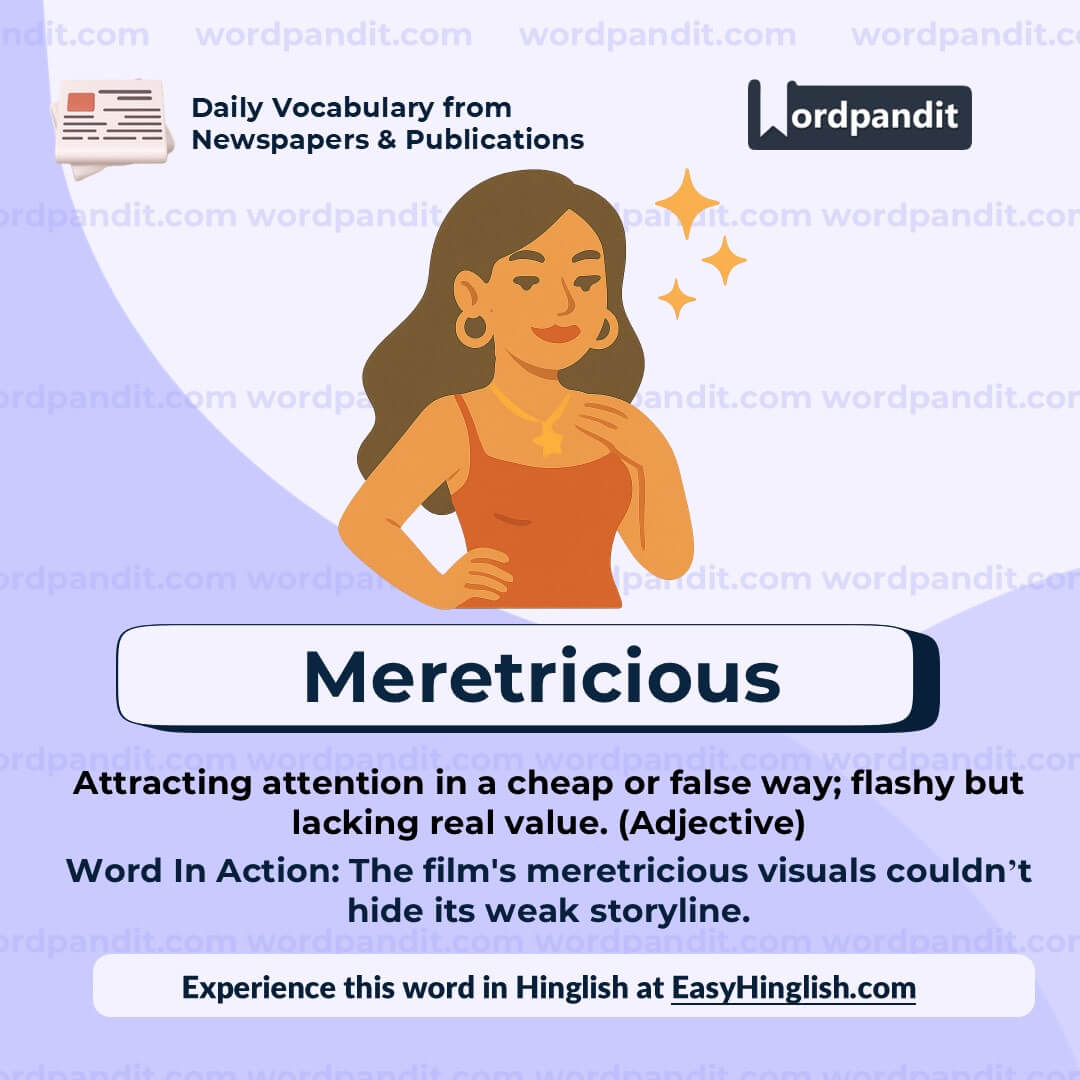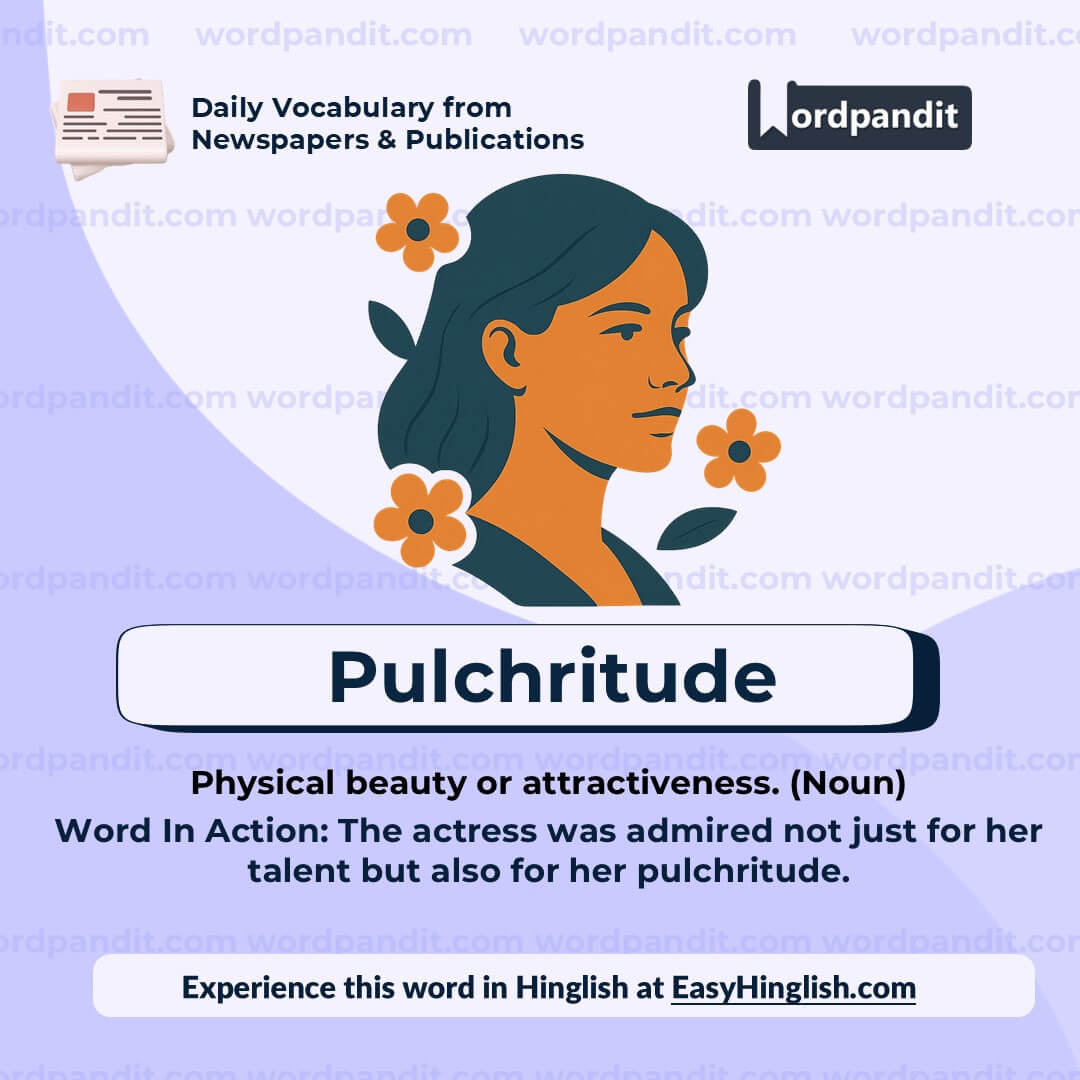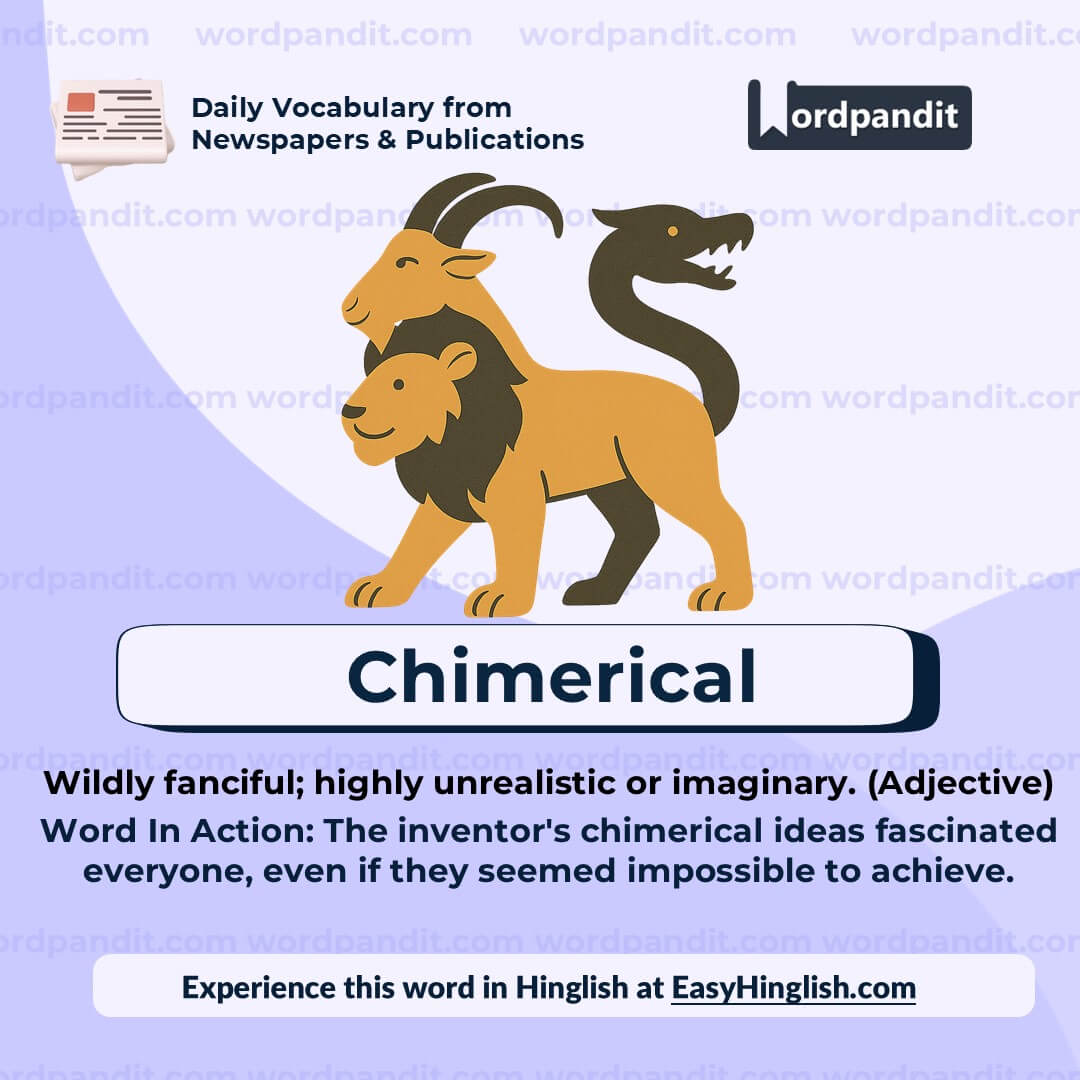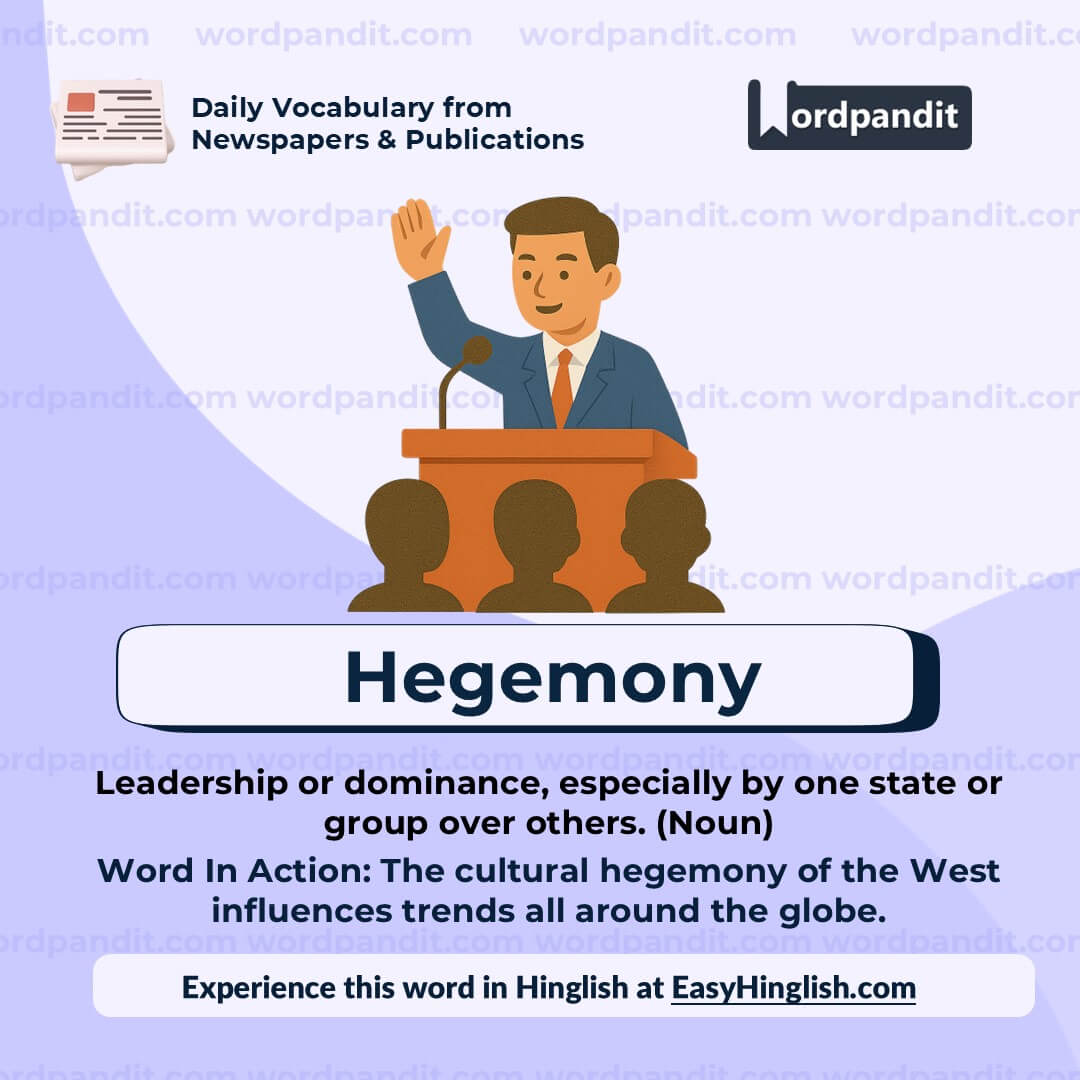Daily Vocabulary from International Newspapers and Publications
Expand Your Vocabulary with Wordpandit’s Global Vocabulary Hub
At Wordpandit, we are committed to helping you develop a truly global vocabulary by drawing from some of the most respected international publications. This section is designed to keep you ahead of the curve by introducing you to words that define global conversations and trends.
The Power of Global Sources
To help you think and communicate on a global scale, we curate vocabulary from renowned international sources, such as:
- The New York Times
- The Washington Post
- BBC
- The Guardian
- The Economist
- Scientific American
- Psychology Today
- And many more...
Stay Global, Stay Competitive
Our daily updates from international publications ensure you are consistently exposed to new words that reflect global news and developments, making sure your vocabulary is not only current but also globally relevant.
Enhance Your Global Perspective
Whether you’re preparing for international exams, aiming to excel in global business communication, or want to enhance your language skills for personal growth, Wordpandit offers the resources you need to thrive in a global context.
Effective Learning, Global Reach
Our learning methodology combines global examples, memory aids, and interactive activities, allowing you to internalize new words effectively and apply them in real-world scenarios.
Begin Your Global Vocabulary Journey Now!
Why Choose Wordpandit?
Practical Learning: Focus on words you'll actually encounter in real-world reading, enhancing your comprehension and communication skills.
Diverse Content: From current affairs to scientific breakthroughs, our varied sources expose you to vocabulary across multiple domains.
Effortless Integration: Make Wordpandit a part of your daily routine. Just a few minutes each day can significantly boost your lexicon over time.
Your Path to Vocabulary Mastery
- Visit our Daily Vocabulary section regularly
- Explore new words and their usage in context
- Practice incorporating these words into your own writing and speech
- Track your progress as your vocabulary expands
Start Your Journey Today
Embark on your vocabulary enhancement journey with Wordpandit. By consistently engaging with our daily posts, you'll build a robust vocabulary that serves you well in academic, professional, and personal contexts.
Remember, a word a day keeps linguistic limitations at bay. Make Wordpandit your daily companion in the quest for vocabulary excellence!
WORD-1: Peripatetic
Context:
"Her peripatetic childhood as the daughter of a diplomat informed her nuanced understanding of cross-cultural communication." - NPR
Explanatory Paragraph:
The word "peripatetic" describes someone who travels frequently, often from place to place for work, education, or lifestyle reasons. It is commonly used to refer to individuals whose careers or upbringings involve constant movement, such as diplomats, military families, or traveling professionals. While the word can imply instability, it often carries a tone of rich experience and adaptability.
Meaning: Traveling from place to place, especially for work (Adjective/Noun)
Pronunciation: per-uh-puh-TET-ik
Difficulty Level: ⭐⭐⭐⭐ Advanced
Etymology: From Greek "peripatētikos" meaning "given to walking about", from "peri-" (around) + "patein" (to walk).
Prashant Sir's Notes:
This word is perfect to describe people with nomadic careers or upbringing. Connect it with modern professions like travel bloggers, diplomats, or consultants. Use it not just for physical movement but also metaphorically to describe a lifestyle of exploration.
Synonyms & Antonyms:
Synonyms: itinerant, nomadic, wandering, roving, migratory
Antonyms: settled, stationary, rooted, anchored
Usage Examples:
- After years of a peripatetic lifestyle, she finally decided to settle down in a quiet village.
- The peripatetic professor held lectures in different countries every semester.
- His peripatetic journey across Asia deeply influenced his artwork.
- Many consultants live a peripatetic life, constantly traveling to meet clients.
Cultural Reference:
"The Peripatetic school of philosophy, founded by Aristotle, emphasized walking discussions in the Lyceum gardens." - Encyclopedia Britannica
Think About It:
Does a peripatetic lifestyle expand one's worldview, or does it hinder the formation of deep, lasting relationships?
Quick Activity:
Make a list of three careers or lifestyles that could be described as peripatetic. Then, use the word in a sentence for each.
Memory Tip:
Think of “peri” (around) and “patetic” like “patrol” — someone who walks around — hence, constantly moving or traveling.
Real-World Application:
"Peripatetic" is useful in professional bios or essays when describing careers that involve frequent relocation, such as consultants, journalists, or humanitarian workers.
WORD-2: Meretricious
Context:
"The critique dismissed the bestseller as meretricious, trading substance for stylistic flourishes and oversimplified conclusions." - Literary Review
Explanatory Paragraph:
“Meretricious” is used to describe something that appears attractive or flashy on the surface but lacks real value, depth, or sincerity. It often refers to things that are showy in a cheap or deceptive way—like a movie full of visual effects but lacking plot, or a speech that sounds impressive but says little of substance. The word has a negative connotation and suggests superficiality or false appeal.
Meaning: Attractive in a deceptive or superficial way; falsely showy (Adjective)
Pronunciation: meh-ruh-TRISH-us
Difficulty Level: ⭐⭐⭐⭐ Advanced
Etymology: From Latin "meretricius", meaning "of or like a prostitute", from "meretrix" (prostitute), which comes from "merēre" (to earn or deserve).
Prashant Sir's Notes:
This is a great critical vocabulary word, often used in literature or art reviews. Remember: something meretricious *looks good* but *isn’t good*. It’s all glitter, no gold. Excellent for essays or critiques where you want to subtly dismiss something as shallow.
Synonyms & Antonyms:
Synonyms: gaudy, flashy, pretentious, superficial, tawdry
Antonyms: genuine, understated, authentic, subtle, tasteful
Usage Examples:
- The politician's meretricious promises won him attention but not long-term support.
- Many critics found the movie meretricious—visually stunning but emotionally hollow.
- She avoided meretricious fashion trends in favor of timeless elegance.
- The artwork was dismissed as meretricious, lacking the soul of true creativity.
Cultural Reference:
"The Great Gatsby is filled with meretricious splendor—a glittering world masking emptiness beneath." - Literary analysis of F. Scott Fitzgerald's novel
Think About It:
In an age driven by aesthetics and social media, how do we distinguish between true value and meretricious appeal?
Quick Activity:
List three things in modern culture (e.g., products, celebrities, or media trends) that you think might be described as meretricious. Explain why.
Memory Tip:
Think “meretricious” = “merely attractive”—it looks nice but it’s just a trick. Or remember “meretricious = trick-icious.”
Real-World Application:
Use “meretricious” in reviews, critiques, or analytical writing when pointing out that something is flashy or attractive but lacks depth or authenticity. Ideal for film, literature, or even marketing critiques.
WORD-3: Pulchritude
Context:
"The exhibition celebrates the natural pulchritude of landscapes untouched by industrial development." - Smithsonian Magazine
Explanatory Paragraph:
“Pulchritude” is a formal and somewhat old-fashioned word that means physical beauty, particularly of an impressive or striking kind. It’s often used in literary or poetic contexts rather than everyday conversation. Despite its harsh, awkward sound, it ironically refers to something pleasing or beautiful. It can apply to people, places, or even moments of natural beauty, as seen in the exhibition quote above.
Meaning: Physical beauty; loveliness (Noun)
Pronunciation: PUL-kruh-tood
Difficulty Level: ⭐⭐⭐⭐ Advanced
Etymology: From Latin "pulchritudo", from "pulcher" meaning "beautiful".
Prashant Sir's Notes:
This is a “deceptive word”—it sounds unappealing but actually means beauty! Great for poetic usage or to add a sophisticated flair to your writing. Use it sparingly in modern English unless you want to be humorous or literary.
Synonyms & Antonyms:
Synonyms: beauty, loveliness, attractiveness, elegance
Antonyms: ugliness, plainness, unattractiveness, homeliness
Usage Examples:
- The pulchritude of the mountain range left visitors in stunned silence.
- Though the word “pulchritude” is rarely used, it perfectly captured her timeless beauty.
- The garden bloomed with a wild pulchritude that no manicured park could match.
- He was captivated by her pulchritude, though his admiration extended far beyond appearance.
Cultural Reference:
"Pulchritude may be rare in speech, but it thrives in poetry and prose, often used to elevate beauty to a near-sacred quality." - The Atlantic (Literary Commentary)
Think About It:
Why do we sometimes use grand or archaic words like “pulchritude” to describe beauty—does it change how we perceive the beauty being described?
Quick Activity:
Write a short descriptive paragraph (3-4 lines) about a place or person you find beautiful using the word "pulchritude."
Memory Tip:
Think of “pulchritude” as “pretty + attitude” — even though the word sounds clunky, it means beauty with presence!
Real-World Application:
Though rare in casual speech, "pulchritude" is useful in literary writing, art critiques, and poetic descriptions where elevated or formal language is appreciated.
WORD-4: Chimerical
Context:
"Critics describe the economic plan as chimerical, promising growth rates that no developed economy has sustained in the modern era." - The Economist
Explanatory Paragraph:
The word "chimerical" refers to something that is wildly fanciful, highly unrealistic, or purely imaginative. It often describes ideas, ambitions, or plans that sound impressive or visionary but are so unlikely or impractical that they border on the impossible. The term is rooted in mythology and conveys a sense of illusion or fantasy dressed up as ambition. It’s a powerful word for calling out pipe dreams masked as strategy.
Meaning: Unrealistic, fantastical, or wildly imaginative (Adjective)
Pronunciation: kai-MER-ih-kul
Difficulty Level: ⭐⭐⭐⭐ Advanced
Etymology: From Latin "chimaera", derived from Greek "khimaira", a mythical fire-breathing creature composed of parts of different animals.
Prashant Sir's Notes:
This is a great word to label unrealistic proposals, policies, or plans that sound grand but lack grounding in reality. Use it especially in analytical writing or critiques. Think: If it sounds like fantasy, it might be chimerical!
Synonyms & Antonyms:
Synonyms: fanciful, illusory, visionary, impractical, quixotic
Antonyms: realistic, pragmatic, achievable, grounded
Usage Examples:
- The startup's chimerical projections were met with skepticism by seasoned investors.
- His dream of colonizing Mars within five years seemed more chimerical than scientific.
- The film presents a chimerical world where time flows backward and logic bends.
- She dismissed the idea as chimerical, insisting on a more practical approach.
Cultural Reference:
"In mythology, a Chimera is a fire-breathing creature composed of lion, goat, and serpent—symbolizing the impossible. Today, ‘chimerical’ ideas carry that same flavor of dazzling impossibility." - Oxford Classical Dictionary
Think About It:
Can chimerical visions, even if unrealistic, still serve as catalysts for innovation or change?
Quick Activity:
Write down two examples of chimerical ideas from politics, science fiction, or technology. Then, explain why they might be considered unrealistic.
Memory Tip:
Think “chimerical” = “chimera + miracle” — like a miraculous fantasy that exists only in dreams or myths!
Real-World Application:
"Chimerical" is a strong adjective for critiques, particularly in economics, politics, or business strategy, where you want to challenge the feasibility of an overly ambitious or utopian proposal.
WORD-5: Hegemony
Context:
"The paper examines the shifting hegemony in global technology sectors as new players emerge from previously peripheral economies." - Foreign Affairs
Explanatory Paragraph:
“Hegemony” refers to leadership or dominant influence by one group, nation, or entity over others—especially in political, economic, or cultural spheres. The term is often used to describe how a powerful country, company, or ideology shapes and controls others, not always by force, but through dominance of norms, markets, or values. It suggests a kind of authority that is accepted, either openly or implicitly, by those under its influence.
Meaning: Dominant leadership or influence, especially by one country or group over others (Noun)
Pronunciation: huh-JEM-uh-nee or HEJ-uh-moh-nee
Difficulty Level: ⭐⭐⭐⭐ Advanced
Etymology: From Greek "hēgemonia", from "hēgemōn" meaning "leader", from "hēgeisthai" (to lead).
Prashant Sir's Notes:
This is a crucial term in political science, international relations, and cultural studies. Use it when analyzing power structures or discussing influence—especially subtle, systemic control rather than direct rule. It often appears in academic writing and debates.
Synonyms & Antonyms:
Synonyms: dominance, supremacy, control, leadership, authority
Antonyms: subordination, equality, submission, inferiority
Usage Examples:
- The hegemony of the English language in global business often sidelines local tongues.
- For decades, the United States maintained technological hegemony through innovation and investment.
- Some critics argue that cultural exports are a form of soft hegemony, subtly influencing global norms.
- The fall of the empire marked the end of its economic and military hegemony in the region.
Cultural Reference:
"Antonio Gramsci, an Italian Marxist thinker, expanded the idea of cultural hegemony—suggesting that dominant classes maintain control not just by force, but by shaping accepted ideas and beliefs." - Gramsci’s Prison Notebooks
Think About It:
Is it possible to challenge global hegemony without disrupting international cooperation or stability?
Quick Activity:
Identify one example of political, economic, or cultural hegemony in the world today. Write a few lines explaining how it affects smaller or less powerful players.
Memory Tip:
Think “hegemony” = “head money” — the one at the head (top) controls the rest, often in subtle ways.
Real-World Application:
"Hegemony" is frequently used in global affairs, business, and academic writing to analyze how influence is exercised across borders, industries, or ideologies. It’s a go-to term in international relations discussions.



















